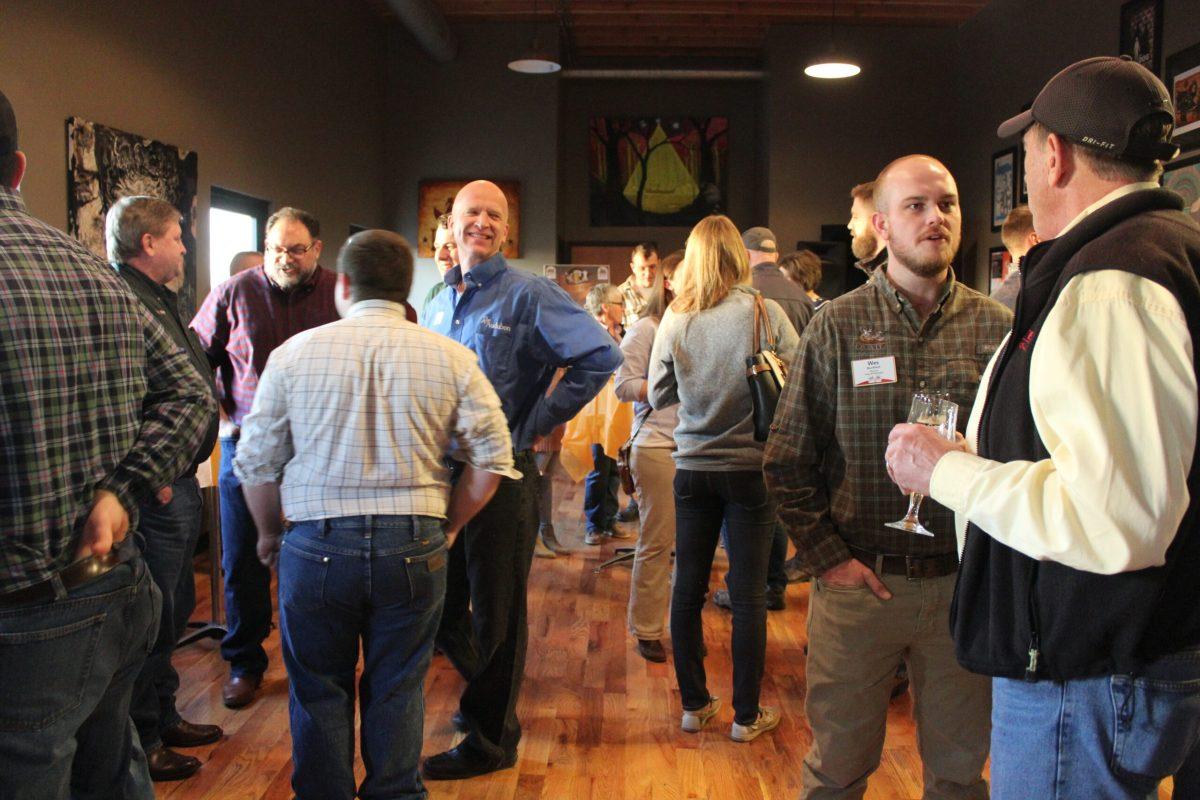“Want more birds?” A sign in the corner of the room asked in huge letters. “Let’s talk habitat,” it read underneath. The rustic upper level of Logboat Brewing Company on Friday, March 15, was filled with people doing just that: talking habitat. Crowded around tables covered with orange table cloths, members of Audubon, Pheasants Forever and Quail Forever and the Missouri Department of Conservation drank beers, ate beef and discussed birds, checking off every part of the evening’s Birds, Beef & Brews Bash.
The Birds, Beef & Brews Bash took place as a kickoff to Pheasants Forever and Quail Forever’s first meeting of its sixth year. The goal of Pheasant Forever and Quail Forever is four-fold: They focus on “habitat improvements, public awareness, education and land management policies and programs,” according to the Pheasants Forever website.
Casey Bergthold, the Missouri state coordinator for Pheasants Forever and Quail Forever, said this event was an example of spreading public awareness and helping educate people about habitat conservation and bird-friendly beef.
“We’re a conservation organization, we’re the habitat organization, so anywhere we can do habitat work and put habitat on the ground, that’s where we want to do good work,” Bergthold said. “The whole idea [of this program] is that we can graze cattle in a manner that is good for wildlife and we can build in some economic incentives there to help make that something that is more profitable and to get folks interested in doing that.”
Pheasants Forever and Quail Forever works with other organizations, such as bird conservation group Audubon, the Missouri Department of Conservation and local businesses like the Root Cellar, to promote habitat protection. Bergthold credits Max Alleger, grassland program coordinator for the Department of Conservation, with the inclusion of Pheasants Forever and Quail Forever in this partnership. Alleger, Bergthold said, brought this program to the attention of the organization, allowing them to advocate for pheasants and quail through it.
“It sounded like a program that made a lot of sense for us,” Bergthold said. “Any time we can work with agriculture farmers and ranchers to help make them more money, increase their profits and do great things for wildlife, it’s just a win-win.”
The event itself featured a course of bird-friendly, Audubon-certified beef. This beef is certified as bird-friendly because of grazing rotations, which allow for habitat conservation for birds on the land where cattle is kept. By buying this kind of meat, Alleger said, consumers can promote all the partnered organizations and also help wildlife.
“It’s really about bringing people who are interested in quails and quail habitat together with an opportunity for them to use their food dollars to help support better habitat on real Missouri farms,” Alleger said. “So it’s a really powerful idea that you use your food dollar not only to feed yourself but to vote for what kind of world you want to live in.”
Chris Wilson, director of the Audubon ranching program, said this kind of habitat conservation is important because Audubon has observed a steep decrease in the amount of grassland birds in recent years. Through the preservation of cattle farmers’ grasslands, these numbers can be affected and bird populations may be helped.
“We recognized that if we were going to do something about grassland bird population decline, we needed to think about a whole new strategy besides what’s been done in the past,” Wilson said.
As for the Birds, Beef & Brews Bash, Wilson said he was excited to introduce more people to this program and the idea of buying conservation-friendly beef, while Bergthold was anticipating a chance to eat the beef the organizations were working to create.
“If you’ve never had the Audubon-certified rancher beef, it’s really good quality,” Bergthold said. “The ranches that are raising it are the best that are out there and that’s kind of brought through the supply chain, the Root Cellar, and so you don’t get any better beef anywhere.”
Although MU currently does not have a student chapter of Pheasants Forever and Quail Forever, there are several student chapters throughout the state for students looking to be involved in the conservation of birds.
_Edited by Janae McKenzie | [email protected]_








